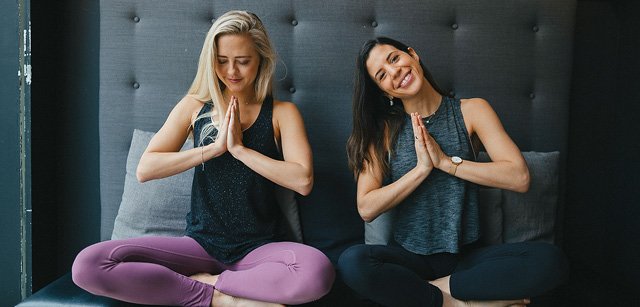How breath is the most underrated tool to cope with stress
Have you ever wondered why you feel so delicious after a yoga session?
Why do people tell us to take a deep breath when we are feeling overwhelmed or out of focus?
Or, why is it that Hollywood shows us people frantically breathing into a paper bag on planes when they are having a panic attack?
Well… it turns out it is in THE POWER OF THE BREATH.
The science illustrates why and how breathing can support cognitive processes and help us to manage stress, anxiety AND depression.
Of course, it’s not just any type of breath.
Today we bring your attention to diaphragmic breathing or belly breathing.
In yoga, a form commonly used is referred to as ujjayi – a Sanskrit term denoting victory (we will see why!)
A notable feature of ujjayi breathing is the hissing sounds it creates as a result of a gentle constriction in the back of the throat.
Our top tip: think of channelling your inner Darth Vader when finding your ujjayi breath!
How does breathing work to de-stress?
In today’s hectic times where we are bombarded with pending deadlines, getting to work on time, packing the kid’s lunches, getting them to school, managing finances AND if we’re lucky making it to our exercise class on time, we often find ourselves in a stressful and hyper-stimulated state, which means our sympathetic nervous system – responsible for the fight-flight-freeze response – ends up being activated more often than not.
With ujjayi breath, the gentle constriction in the back of the throat stimulates the vagus nerve – the tenth cranial nerve that spans the heart, lungs and digestive tract. This nerve is linked to the parasympathetic nervous system, which opposes our sympathetic nervous system and is responsible for the rest, relaxation, digestion and reproduction.
By tapping into the parasympathetic nervous system, we can instantly neutralise or diminish our stressful state to achieve a sense of calm and peace.
One study looking at medicated patients with symptoms of anxiety and depression found the use of a breathing-based meditation technique called Sudarshan Kriya Yoga let to better outcomes and a reduced overall score on the Hamilton Depression Rating Scale compared to those who did not do the breathing exercise (in conjunction with conventional medication).
Another study observing 40 participants (equally represented by males and females) found that compared to a control group (where the individuals did not receive treatment) those who engaged in diaphragmic breathing were found to have reduced cortisol levels in their saliva and improved attention span.
We think this is pretty special and an extremely underutilised tool.
Studies show controlled breathing techniques have the capacity to alter biological systems, influence our heart rate, cortisol levels and cognitive performance!
Potential pathways include increasing inhibitory neurotransmitters (a fancy word for brain chemicals) such as GABA and reducing the production of stress hormone cortisol.
This demonstrates how we can see benefits on both physiological and physical levels.
Recommendations have even been published by the National Health Service for stress relief, anxiety and depression. (https://www.nhs.uk/conditions/stress-anxiety-depression/ways-relieve-stress/)
How do we use this to our advantage?
As avid yogis and mindfulness ambassadors, we often prompt clients in our sessions to engage in breathing exercises which almost unequivocally results in a sense of ease and relaxation.
We often find clients try to cope with high stress levels by eating.
Of course, this is a normal response if it happens occasionally, however, if we repeat the behaviour enough this can become a difficult habit to break.
What we try to encourage instead is the use of breathing exercises as a preventative measure.
This is an effective way to improve the muscular tone of your diaphragm and to train you for when you may need it most! Whether it be ujjayi or 4-7-8 breath (where you inhale on 4 counts, hold 7 counts, exhale 8 counts) or square breathing (inhale 5, hold 5, exhale 5, hold 5) try it for yourself and notice the difference.
Breathing tips
The wonderful news is you have your lungs with you AT ALL TIMES (at least we hope you do).
Slowing down your breath is something you can access at any time of the day as an effective preventative or stress management tool.
Whether you are overwhelmed or the mind is busy, ease into your Darth Vader breath and all will be well.
To learn more about the wonderful programmes and support we offer, email [email protected] to find out more. We can’t wait to work with you.
Ariana Rodriguez, RD, MSc
Team EHL x
References
- Scott, T, et. al. Psychological Function, Iyengar Yoga, and Coherent Breathing: A Randomized Controlled Dosing Study. Journal of Psychiatric Practice: November 2019 – Volume 25 – Issue 6 – p 437–450
- Sengupta, P. Health Impacts of Yoga and Pranayama: A State-of-the-Art Review. Int J Prev Med. 2012 Jul; 3(7): 444–458
- Anup Sharma, Marna S. Barrett, Andrew J. Cucchiara, Nalaka S. Gooneratne, Michael E. Thase. A Breathing-Based Meditation Intervention for Patients With Major Depressive Disorder Following Inadequate Response to Antidepressants. The Journal of Clinical Psychiatry, 2016; DOI: 4088/JCP.16m10819
- Ma, X. et al. The Effect of Diaphragmatic Breathing on Attention, Negative Affect and Stress in Healthy Adults, Front Psychol, 2017 Jun; 8: 847.













